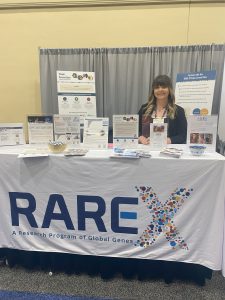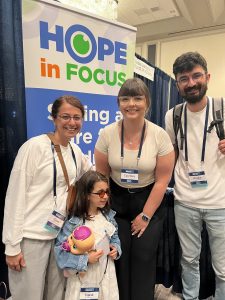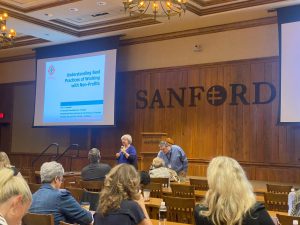Spring on the Road
 May and June were busy travel months full of opportunities and learning for me as Director of Outreach and Development for Hope in Focus. Each year, I attend the Association for Research in Vision and Opthalmology (ARVO) Annual Meeting to hear the latest research updates for inherited retinal diseases (IRD). This conference brings together over 12,000 attendees and offers dozens of hours of presentations about therapy advances and provides a place for industry, advocacy, and the academic community to converge and connect on advancing research.
May and June were busy travel months full of opportunities and learning for me as Director of Outreach and Development for Hope in Focus. Each year, I attend the Association for Research in Vision and Opthalmology (ARVO) Annual Meeting to hear the latest research updates for inherited retinal diseases (IRD). This conference brings together over 12,000 attendees and offers dozens of hours of presentations about therapy advances and provides a place for industry, advocacy, and the academic community to converge and connect on advancing research.
I then headed off to Sioux Falls, South Dakota, for my second year of training in the Professional Patient Advocates in the Life Sciences Certification Training Course. The course p rovides two tracks, one for those with a patient advocacy role in industry, and the other for those involved in nonprofit patient advocacy organizations. It is a small group with limited class sizes that provides an in-depth education on the roles and responsibilities of a patient advocate. We have important discussions on how to work together and best serve our communities, and I bring back so much of that learning into this role every day.
rovides two tracks, one for those with a patient advocacy role in industry, and the other for those involved in nonprofit patient advocacy organizations. It is a small group with limited class sizes that provides an in-depth education on the roles and responsibilities of a patient advocate. We have important discussions on how to work together and best serve our communities, and I bring back so much of that learning into this role every day.
In June, I headed to Chicago with the Hope in Focus team to the 2024 VISIONS conference, which is held biennially and hosted by the Foundation Fighting Blindness. VISIONS brings together over 500 attendees from the inherited retinal disease community, many of whom are living with an IRD. We had a packed two days of listening to important updates and inspiring lectures, and our favorite was meeting families affected by Leber congenital amaurosis (LCA). Haydar, Gizem, and Toprak from this month’s lead story also attended and brought along another family from Turkey whose daughter has LCA1 GUCY2D. It was amazing to see them again! We also met a new family that has two daughters with LCA9 due to a mutation in their CRB1 gene.
I am so grateful for these opportunities to connect in person with all the facets of our community working to bring treatments to those living with inherited retinal disease.


